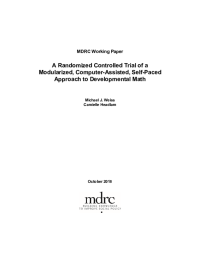A Randomized Controlled Trial of a Modularized, Computer-Assisted, Self-Paced Approach to Developmental Math

Community colleges are a large sector of postsecondary education. In 2016-2017, the United States had nearly 1,000 public 2-year postsecondary institutions (community colleges), serving almost nine million students, representing 39% of all undergraduates. The majority of entering community college students require developmental (or remedial) math. Success rates in the developmental math course sequence and college more broadly are discouragingly low. Policymakers, practitioners, and researchers alike are eagerly searching for reforms to improve success rates, but there is a dearth of causal evidence on the effectiveness of most proposed reforms. We sought to answer the following question: What effect does a modularized, computer-assisted, self-paced approach to developmental math (compared with a more “traditional” direct-instruction course alternative) have on students’ likelihood of completing the developmental math course sequence? Findings from a randomized controlled trial (n =1,403) are presented. The program was well implemented; however, we did not find evidence that this approach was superior to the “traditional” math class. Although these results are disappointing, they are important because modularization and self-paced computer-assisted instruction are popular reforms.






